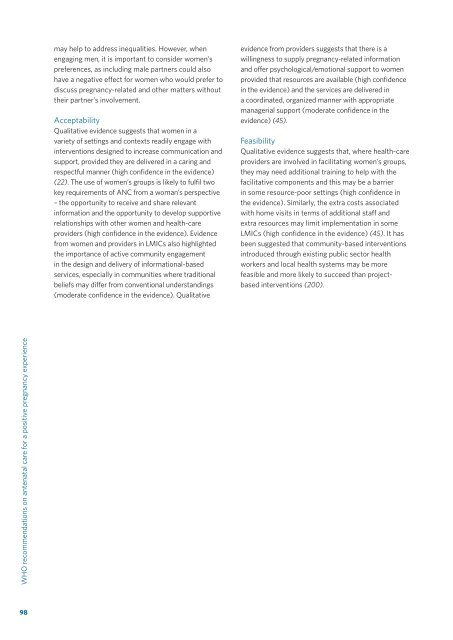WHO recommendations on antenatal care for a positive pregnancy experience
5pAUd5Zhw
5pAUd5Zhw
Create successful ePaper yourself
Turn your PDF publications into a flip-book with our unique Google optimized e-Paper software.
may help to address inequalities. However, when<br />
engaging men, it is important to c<strong>on</strong>sider women’s<br />
preferences, as including male partners could also<br />
have a negative effect <strong>for</strong> women who would prefer to<br />
discuss <strong>pregnancy</strong>-related and other matters without<br />
their partner’s involvement.<br />
Acceptability<br />
Qualitative evidence suggests that women in a<br />
variety of settings and c<strong>on</strong>texts readily engage with<br />
interventi<strong>on</strong>s designed to increase communicati<strong>on</strong> and<br />
support, provided they are delivered in a caring and<br />
respectful manner (high c<strong>on</strong>fidence in the evidence)<br />
(22). The use of women’s groups is likely to fulfil two<br />
key requirements of ANC from a woman’s perspective<br />
– the opportunity to receive and share relevant<br />
in<strong>for</strong>mati<strong>on</strong> and the opportunity to develop supportive<br />
relati<strong>on</strong>ships with other women and health-<strong>care</strong><br />
providers (high c<strong>on</strong>fidence in the evidence). Evidence<br />
from women and providers in LMICs also highlighted<br />
the importance of active community engagement<br />
in the design and delivery of in<strong>for</strong>mati<strong>on</strong>al-based<br />
services, especially in communities where traditi<strong>on</strong>al<br />
beliefs may differ from c<strong>on</strong>venti<strong>on</strong>al understandings<br />
(moderate c<strong>on</strong>fidence in the evidence). Qualitative<br />
evidence from providers suggests that there is a<br />
willingness to supply <strong>pregnancy</strong>-related in<strong>for</strong>mati<strong>on</strong><br />
and offer psychological/emoti<strong>on</strong>al support to women<br />
provided that resources are available (high c<strong>on</strong>fidence<br />
in the evidence) and the services are delivered in<br />
a coordinated, organized manner with appropriate<br />
managerial support (moderate c<strong>on</strong>fidence in the<br />
evidence) (45).<br />
Feasibility<br />
Qualitative evidence suggests that, where health-<strong>care</strong><br />
providers are involved in facilitating women’s groups,<br />
they may need additi<strong>on</strong>al training to help with the<br />
facilitative comp<strong>on</strong>ents and this may be a barrier<br />
in some resource-poor settings (high c<strong>on</strong>fidence in<br />
the evidence). Similarly, the extra costs associated<br />
with home visits in terms of additi<strong>on</strong>al staff and<br />
extra resources may limit implementati<strong>on</strong> in some<br />
LMICs (high c<strong>on</strong>fidence in the evidence) (45). It has<br />
been suggested that community-based interventi<strong>on</strong>s<br />
introduced through existing public sector health<br />
workers and local health systems may be more<br />
feasible and more likely to succeed than projectbased<br />
interventi<strong>on</strong>s (200).<br />
<str<strong>on</strong>g>WHO</str<strong>on</strong>g> <str<strong>on</strong>g>recommendati<strong>on</strong>s</str<strong>on</strong>g> <strong>on</strong> <strong>antenatal</strong> <strong>care</strong> <strong>for</strong> a <strong>positive</strong> <strong>pregnancy</strong> <strong>experience</strong><br />
98


